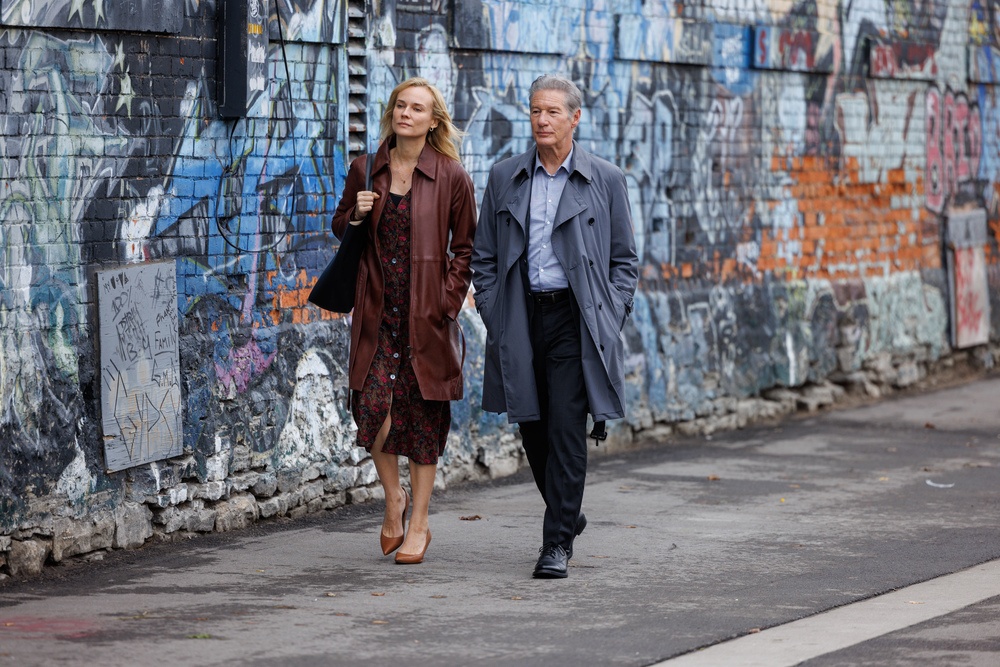Capsule reviews for June 7

Diane Kruger and Richard Gere star in LONGING. (Photo: Lionsgate)
Am I OK?
Beneath some conventional genre contrivances, this charming romantic comedy is a tender and sincere look at relationships for those whose sexual preferences and chronology don’t fit into typical boxes. As her best friend (Sonoya Mizuno) prepares to move overseas for work, Lucy (Dakota Johnson) is an aspiring artist in her early 30s who suddenly feels left out. Fearful of intimacy, she becomes curious about a flirty coworker (Kiersey Clemons) who seems open to experimentation. But to find happiness, Lucy needs to conquer her own neuroses. The sharp cast generates some big laughs, while the screenplay modulates its silliness with an assured perspective and emotional depth. (Rated R, 86 minutes).
Banel and Adama
Although it’s rough around the edges, this evocative coming-of-age romance from Senegal is a quietly powerful exploration of patriarchal traditions, rituals, oppression, and conformity. The title characters are teenage newlyweds from a drought-stricken desert town, where Adama (Mamadou Diallo) rejects his inherited claim to be village chief in order to pursue the couple’s dreams together. However, his relatives interfere and blame the defiant Banel (Khady Mane), whose refusal to bear children in accordance with religious customs causes friction and threatens their relationship. Despite an ambiguous ending, the screenplay by rookie director Ramata-Toulaye Sy resonates with bittersweet compassion as it chronicles Banel’s quest for empowerment and self-worth. (Not rated, 88 minutes).
I Used to Be Funny
A sharply modulated performance by Rachel Sennott (Bottoms) propels this character study about guilt, sisterhood, and fragile family dynamics. Sennott plays Sam, a stand-up comedian who nannies for Brooke (Olga Petsa), a troubled teenager still grieving her mother’s death. They form a tight bond, which sends Sam into a downward spiral after Brooke disappears. Sam’s decision to search for her prompts a backlash from Brooke’s father (Jason Jones). The nonlinear narrative structure feels like a manipulative ploy to ratchet up the suspense, but the script by rookie director Ally Pankiw is an incisive glimpse inside the head of a joke-teller forced to confront solemn realities. (Not rated, 106 minutes).
Late Bloomers
The odd-couple chemistry between its leads gives a mild boost to this otherwise slight and forgettable coming-of-age story that provides another variation on angst-ridden millennials seeking fulfillment on their own terms. In this case, Louise (Karen Gillan) is a misanthropic musician whose bad breakup leads to an embarrassing injury. That sends her to physical therapy, where she strikes up an unlikely friendship with an elderly Polish woman (Margaret Sophie Stein) who is irascible yet wise. Can the two of them change each other’s respective outlook on life? The film charts an unconventional path to redemption, yet seems uncertain how to emotionally navigate its central relationship. (Not rated, 89 minutes).
Longing
Richard Gere’s powerfully understated portrayal elevates this otherwise uneven drama, which explores parental guilt and grief through a slightly absurdist comic lens. Gere plays Daniel, a business mogul who learns from an ex-girlfriend (Suzanne Clement) that he has a teenage son he never knew about, and who recently died in an accident. The revelation prompts Daniel to immerse himself in his son’s troubled life, including a visit with his favorite teacher (Diane Kruger), to process the news and find closure. The screenplay by director Savi Gabizon, remaking his 2017 Israeli film, evolves into an offbeat and somewhat awkward mystery with twists both compelling and calculated. (Rated R, 111 minutes).
Tuesday
Julia Louis-Dreyfus again showcases her versatility, elevating this gimmicky offbeat drama about mortality with a portrayal infused with multilayered vulnerability. She plays Zora, a mother whose teenager daughter (Lola Petticrew) is terminally ill, leading to an ominous visit from Death — in the form of a shapeshifting, colorful macaw. Meanwhile, Zora becomes withdrawn while contemplating her own guilt and grief, trying to bargain with the bird for more time with her daughter. Even if the ambition surpasses the execution, the tender screenplay by rookie director Daina Pusic effectively leans into magical realism while remaining emotionally grounded. Along the way, it becomes more relatable and profound. (Rated R, 110 minutes).